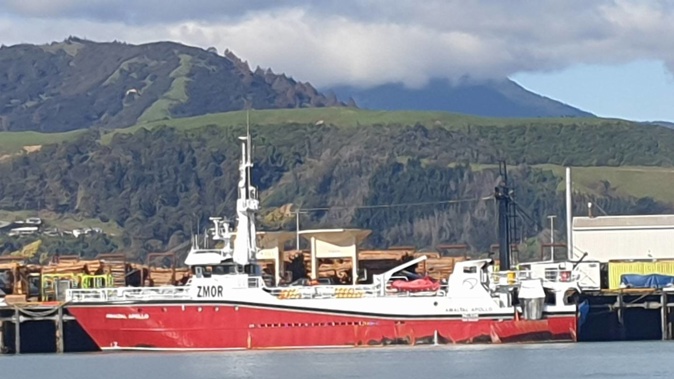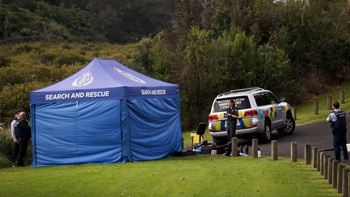
/cloudfront-ap-southeast-2.images.arcpublishing.com/nzme/GVTUITHPWVKFU7LYQQGVZ4322M.jpg)
A deep-sea fishing company has taken the lion's share of penalty for illegal fishing, for which the vessel's skipper was also blamed.
The Amaltal Fishing Company has been convicted and fined $59,500 and its vessel, the Amaltal Apollo, was forfeited, as was fishing equipment and $127,000 worth of fish caught from closed grounds in 2018.
The sale proceeds from the 22 tonnes of fish caught had been held, pending today's sentencing.
Skipper Charles Shuttleworth was also convicted in the Nelson District Court today and fined $12,000 for what Judge David Ruth said was an honest mistake, borne from lack of guidance before setting off on his first deep-sea trip.
The offences related to a total of 14 trawls in two tranches over 10 days in a protected area on Lord Howe Rise, in the Tasman Sea west of New Zealand.
/cloudfront-ap-southeast-2.images.arcpublishing.com/nzme/26MG52RT6HAEIBYY47FSTVWZZE.jpg)
The Amaltal Fishing Company is a subsidiary of Talley's, which has headquarters at Port Nelson. Photo / Tracy Neal
The area was closed to bottom fishing by the South Pacific Regional Fisheries Management Organisation; an inter-governmental organisation, committed to the long-term conservation and sustainable use of the fishery resources of the South Pacific Ocean and safeguarding its marine ecosystems.
The Apollo had at the time been mid-water trawling.
Shuttleworth, a 58-year-old with 40 years' experience at sea, was along with the company found guilty in March this year of 14 charges of breaching the conditions of a high seas fishing permit.
Amaltal Fishing Co Limited is a subsidiary of Talley's Group Limited, which owned the vessel.
The Ministry for Primary Industries brought the charges after it found the Amaltal Apollo had fished in an area closed to trawling by rules that were part of New Zealand's international obligations to protect vulnerable marine ecosystems.
The court found that the incursion into the area was the most significant factor in sentencing, as there was no evidence of harm done to the environment or benthic zone where the vessel had trawled.
Crown lawyer Jackson Webber, who was assisting MPI, told the court today that while no one said Shuttleworth had acted on purpose, what he had done was however "more than mere carelessness".
Shuttleworth had since been demoted to the position of mate and had suffered financial losses of between $150,000 to $200,000.
He was not in court today, having left yesterday on another fishing trip.
The confusion Shuttleworth claimed, which in 2018 led to him taking the vessel into the closed area, was because he had misinterpreted electronic data on the vessel's SeaPlot software – a multi-layered plotting program designed to improve catch efficiencies.
Judge Ruth said it may have been that the correct layer of data was on the program but it had not been explained to Shuttleworth.
/cloudfront-ap-southeast-2.images.arcpublishing.com/nzme/5G7F3LUI7YLEVPHZ3O5CIZ6PSY.jpg)
Amaltal Appollo tied up at Port Nelson. Photo / Tracy Neal
He said the problem might have been fixed if he had compared the information on the plotter with that contained in the high seas fishing permit needed for such a trip.
The permit was new and no one had checked the coordinates on the electronic plotter. Neither had it been made clear that the area in question had been closed since 2015, Judge Ruth said.
"A relatively low-tech process might have obviated what happened."
Judge Ruth was pleased to see considerable steps had been taken to prevent similar happening again, helped by Amaltal's introduction of geo-fencing technology in its fleet, which electronically recognised fishing boundaries on plotted maps.
"I have reached the view there was a confusion that existed on the boat; some of it down to skipper carelessness but mainly Amaltal omissions," Judge Ruth said.
"I am however comforted by the fact that steps have been taken to prevent – or reduce the risk of incursion into closed fishing grounds."
He said that while Shuttleworth accepted he was at fault and that he should have looked more closely at documents on board – including the high seas fishing permit, it was simplistic to say this was the sole cause of the illegal fishing which took place.
It was said at the hearing he was not well at the time he took charge of the trip and it was his first time on the high seas, albeit, he was a senior skipper with many years' experience. Shuttleworth had attended a pre-trip briefing but the Mate had not.
Judge Ruth accepted Shuttleworth's genuine remorse over the "significant inconvenience and cost" for a number of people.
"He says it's been a salutary lesson and is more aware of the need for a greater degree of care and responsibility when on board a vessel."
From a starting point of $20,000 in fines, Shuttleworth was given a considerable discount to reflect his loss of status and income since 2018, his previous exemplary record, and the degree to which he had co-operated with the prosecuting authority, MPI.
In sentencing the corporate body, Judge Ruth said it was accepted that Amaltal had suffered somewhat more than the individual as principal offender, but there were a number of factors best described as "omissions on the part of Amaltal" that led to his finding it was liable.
"It is clear to me that by reason of fact that more in-depth information now given to skippers, tells me that this was not only obvious, but very much a low-tech solution that was available, and should have been employed by a diligent employer, who knows the consequences of falling foul of the rules," Judge Ruth said.
He said the company's request for a conviction and discharge was not available, and neither did he find any special reason to avoid forfeiture of the vessel.
Amaltal's potential fine was discounted from $70,000 to reflect remedies adopted post offending, which showed it had taken some responsibility for what happened.
MPI director of compliance services, Gary Orr, said in a post-sentencing statement that fishing companies and their skippers were expected to be fully aware of all areas closed to fishing.
Amaltal spokesman Tony Hazlett said in a statement that the company was disappointed with the outcome.
He said the company didn't consent, agree or direct the vessel to fish in a closed area, and that it took the sustainability of the marine environments where it fished very seriously.
Hazlett said Amaltal would continue to deliver on its responsibility to equip its captains and crew with the training, instruction and the best tools needed to operate the vessels according to the law.
- Tracy Neal, Open Justice
Take your Radio, Podcasts and Music with you









